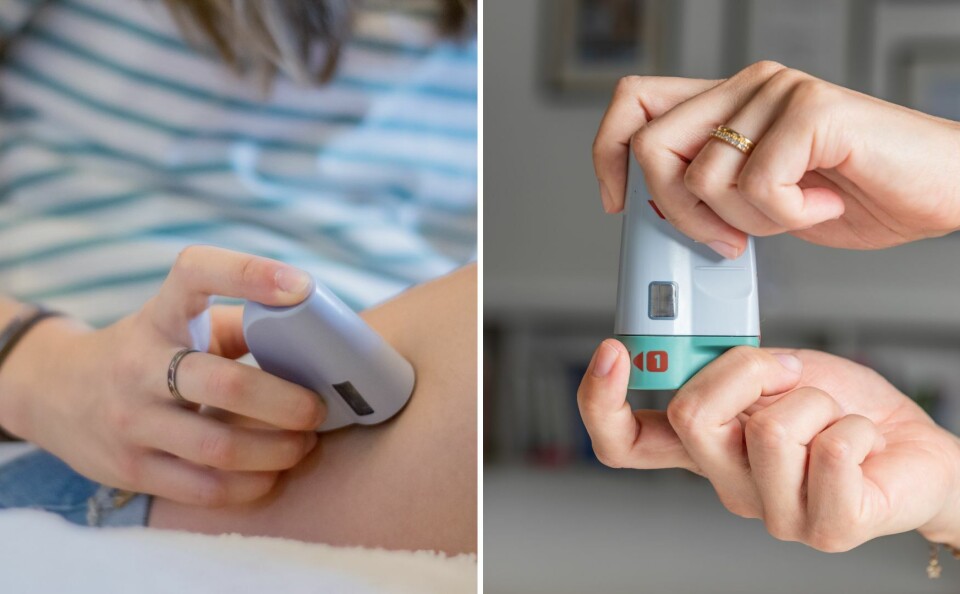-
Health reimbursements linked to income supported by French state auditor
The controversial move aligns with prime minister's plans to cut costs
-
Doctors threaten strike against bill mandating where they work in France
The new bill aims to combat ‘medical deserts’ but young doctors say it will ‘deteriorate access’
-
More than 5,000 French communes use AI to identify poor rubbish sorting
Badly-sorted rubbish can cost millions so communes are turning to high-tech solutions
French firm's needle-free injections win US government contract
The no-needle system uses space rocket technology to ‘shoot’ medicine into patient

A French company which has invented a no-needle medicine injection system has won its first major contract – to supply a US government agency.
The agency has ordered $60million-worth of the devices, called Zeneo, in the first part of a $155million deal.
No training needed
The single-use injectors will be loaded with an anti-epilepsy medicine which is effective against attacks by nerve gas, such as the one used in the Salisbury incident in the UK.
Patrick Alexandre, inventor of the system and president of Crossject, the company which makes Zeneo, told The Connexion: “The big advantage is that they can be used quickly and efficiently by people who have not been trained to give injections.
A dose takes tenth of a second
“With auto-injection systems used at the moment, like the allergy pens many people carry, the full dose is only given by pushing the pen hard against the skin and holding it down hard for around 10 seconds.
“Most people do not know this and the dose ends up running down into their socks.
“With a Zeneo, there is a click and the full dose is given within a tenth of a second.”
No skin mark after Zeneo injection
For patients, the big advantage of being injected with Zeneo is the speed.
“Modern needles are so thin and sharp that they hardly hurt at all,” he said.
“What hurts is the reaction of the medicine with the body at the injection site, and with a needle injection you have to grin and bear it until all the medicine has been pushed down the syringe into you, and only then can the site be rubbed to ease the pain.
“With our system, you can rub it straight away.”
With most people, there is no trace after a Zeneo injection, although some have a slight bruise or a drop of blood.
Space rocket technology
Medicines are shot under the skin, or into a muscle, through micro jets, similar to those found on many computer printers, but the charge comes from exploding chemicals like those used to make solid fuel boosters for space rockets.
“For a typical rocket, 500kg of explosive is used, while we use 0.5mg, but it is the same product,” said Mr Alexandre.
Originally an electrical engineer, he moved into pharmaceutical research with the company Groupe Fournier in Lyon, which does not exist anymore, working on an electric patch system of delivering medicines.
Crossject was originally a spin-off to develop no-needle injections with backing from Fournier and explosives company SNPE, which also no longer exists.
Easy to self-inject
As well as epilepsy medicines, the company is looking at marketing the system for acute kidney disease medicines, rheumatoid arthritis treatments, migraine medicines, opioid overdose antidotes and severe asthma medicines.
“They are all cases where people might have to self-inject or have other people inject them, and with a Zeneo, they can be confident of doing it quickly, easily and well,” said Mr Alexandre.
“They are all medicines which have been tried and tested.
“We are just waiting for certification for the machines and our manufacturing process, which is coming on well, and we should be fully certified and on the market by 2024.”
After the initial candidates, other uses for the Crossject system might be explored, such as injecting cortisone for tendon injuries.
Related articles
Newcomers should follow French vaccination schedule for these diseases
Pollen sensors show real-time data to hay fever sufferers in France
Defibrillator alarm system wins top invention prize in France
























